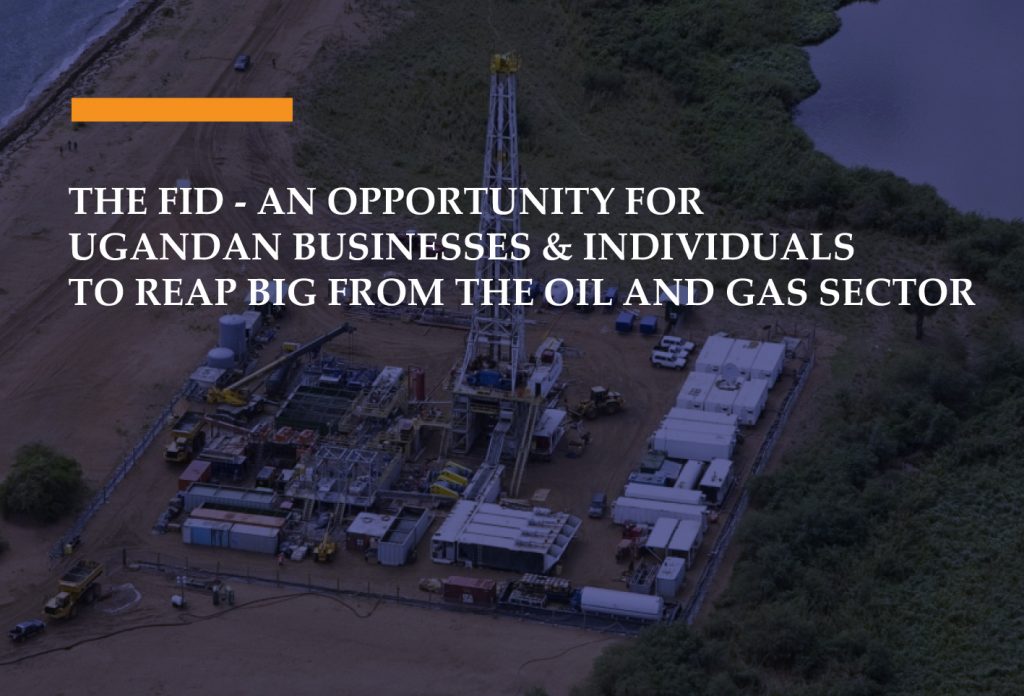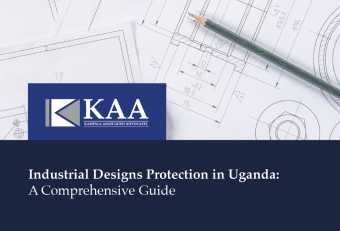Oil and Gas Value Chain
An oil and gas project can be divided into three chronological sectors; upstream, midstream and downstream. The upstream sector involves exploration, appraisal, development, production and finally, the decommissioning phase. The Final Investment Decision (FID) is taken in order to kick start the development phase. On the other hand, the midstream sector involves transportation of the oil while the downstream sector involves its refining and marketing.

What is FID?
FID is the stage at which the International Oil Company (“IOC”) makes a financial commitment to proceed to the development and production phases of the project. Major contracts and equipment orders are placed at this point.
In Uganda’s case, whereas the first commercial discovery of an oil well had been made in 2006, only years later, on 1st February 2022, was FID announced. This followed a series of steps having been taken to commercialize and structure the Oil and Gas sector legally and institutionally to facilitate the exploration of the discovered oil by the IOCs.
With Uganda being a land-locked country and its resource being stranded, there was need to sufficiently consider how best to commercialize the resource. This is owing to the fact that, while developing the upstream sector, there is need to prepare both the midstream and downstream sectors to receive the oil that has been extracted.
A decision was taken by the upstream players and the government of Uganda to construct a 1,443km, 24-inch diameter heated and buried crude oil pipeline, dubbed “the East African Crude Oil Pipeline (EACOP)” from Uganda through Tanzania to carry the crude oil from Uganda to a port on the Indian Ocean. It is projected that over 80% of the pipeline will be in Tanzania, while 20% will be in Uganda.
In order to arrive at FID and commence the construction of EACOP, it was necessary for various contractual arrangements and legal enactments to be made. First, the following had to be in place:
- An inter-governmental agreement between Uganda and Tanzania;
- Host government agreements between the respective host governments and the oil companies;
- A shareholders’ agreement amongst the 4 joint venture partners viz Total Energies (“Total”), China National Offshore Oil Corporation (“CNOOC”), the government of Uganda and the government of Tanzania;
- A tariff and transportation agreement; and
- Legislation in Uganda and Tanzania in respect of the oil and gas project.
In May 2017, the inter-governmental agreement was signed. On 11th April 2021, the host government agreement, shareholders’ agreement and tariff agreement were signed. One of the most significant steps to closing FID was registered in December 2021, when the EACOP (Special Provisions) Bill was finally passed into an Act by parliament. By this, all the conditions precedent to the FID being taken had been concluded.

Thus, on 1st February 2022, Total and CNOOC officially announced that they had inked the final investment decision to kick-start the development phase of the oil and gas sector of Uganda, which will see a capital injection of an unprecedented over Fifteen Billion Dollars into the Ugandan and Tanzanian economy for the next five years. The $15 billion will cover the development of a central processing facility, production well pads, permanent camps, airstrip upgrades, construction camps and yards, and the construction of EACOP from Uganda, through Tanzania, etc.
Significance of the FID
The FID announcement signifies the financial commitment of the oil companies to develop Uganda’s oil and gas resources through the implementation of the Tilenga Project in Buliisa and Nwoya districts; the Kingfisher Project in Hoima and Kikuube Districts; and, EACOP, which will cross the ten (10) districts of Hoima, Kikuube, Kakumiro, Kyankwanzi, Gomba, Mubende, Lwengo, Sembabule, Kyotera and Rakai in Uganda.
Furthermore, FID is one of the important steps in Uganda’s journey to First Oil as it signifies that Uganda’s oil and gas sector is profitable, even amidst the challenges related to the volatile crude oil prices and the ongoing COVID-19 pandemic. FID, therefore, unlocks the single highest value project in the country that will bring in an investment of over $15 billion in the next five years within Uganda.
The FID has unlocked an ecosystem of opportunities that Ugandan companies and individuals in all industries can benefit from. Contracting and procurement in the industry has officially started and is conducted in accordance with the Petroleum (Exploration, Development and Production) Regulations 2016 and the Petroleum (Exploration, Development and Production) (National Content) Regulations 2016. This particularly presents huge opportunities for Ugandan companies and citizens to supply various goods and services, including but not limited to construction materials, catering, agricultural produce, professional services, office supplies, accommodation. This was buttressed by the National Content Regulations, which reserve specific contracts for goods and services to be exclusively provided by Ugandan Citizens and Companies (“ring fenced services”). These include: transportation, security, foods and beverages, catering, human resource management, civil works etc. The Regulations also require contractors and licensees to, in all circumstances, give priority to Ugandan goods and services during procurement.
It is noteworthy that a Ugandan Company is defined as one that is incorporated in Uganda and which-
- provides value addition to Uganda;
- uses available local raw materials;
- employs at least 70% Ugandans; and
- If a joint venture between a Ugandan and non-Ugandan Company, is approved by the Petroleum Authority of Uganda (PAU).
However, for companies and natural persons to participate actively through local content, the companies and persons have to be registered on the National Supplier Database (NSD). The applications are made online via the website of the Petroleum Authority of Uganda, https://www.pau.go.ug. Upon submission of the application and requisite documents, the applications are verified and on successful verification, a company or natural person is listed on the National Supplier Database.
There is also an opportunity for Ugandan citizens to register on the National Oil and Gas Talent Register (NOGTR), where all people with talent are encouraged to register, with an aim of promoting employment of Ugandan Citizens in the oil and gas sector. The NOGTR system also allows employers to register in order to source for talent. This facilitates visibility for recruitment and contracting of qualified engineers, technicians, professionals and other skilled and basic skilled workers across the oil and gas projects. The applications can be made online by following the link https://nogtr.pau.go.ug.
In a nutshell, FID has been concluded and Uganda is currently in the Development phase, after which, the production phase will ensue. As far as Ugandan companies and individuals are concerned, this is the stage to benefit from the sector through investment in the supply of goods and services to the oil companies and by employment through local content. Thus, Ugandan companies and individuals are encouraged to formalize their businesses and apply for listings on the NSD and the NOGTR in order to benefit from the development and production phases in the oil and gas sector. Notably, at the production stage, the government will benefit from cost oil, royalties and corporation tax from the oil production which will be remitted to the government coffers, in the proportions set out by the Production Sharing Agreements and tax laws.






